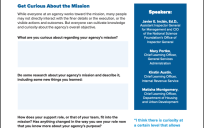How many hours a day do you work? Do you equate the more hours a day you work with the more productive you’ll be? Then, you’re not alone. Many leaders seem to think that “hard work” is measured by the number of hours we work. If so, you need to remember that you’re like an athlete too, so it’s important to take care of yourself.
I used to run marathons and at could often log 60-70 miles a week. (I know you’re thinking why didn’t I just get a car). The funny thing was the more I ran, I never became that much faster. In fact, I ran just as fast with a lesser amount of mileage after I discovered that what I really needed was to mix it up, take a break and take care of myself.
Yes, rest. As it turns out, I was running while tired. I suspect many of us are doing something similar: working while tired and this is reducing our productivity. Work-related stress is a major cause of stress in Western countries. The high-paced and complex work environments employees face today contributes to stress and can often cause burnout. Similar to athletics, to do well, we have to train ourselves physically, emotionally, socially and mentally and with purpose. We must also know when to rest.
Mastering this is akin to the mastering workplace skill competencies. Being resilient is the second side of being tough. That is being able to sustain effort and recover in between the oscillating times of stress and downtime. To do this, like an athlete, we need rituals in the five domains of life:
Physical: Are you reading this article while sitting down? Most knowledge workers spend the majority of their day sitting down and this can lead to over eating, sluggishness and adds to our stress levels. Simple activities like walking meetings, getting up every 45 minutes to walk for 5 minutes up a couple of flights of stairs can help to boost energy, mood and burn off cortisol, a hormone produced during periods of stress.
Emotional: Who isn’t cranky after 8-10 hours of work and then commuting home? High emotional states increase cortisol, diminish our ability to see the broader perspective and our level of empathy or perspective taking. A couple of simple techniques to increase positivity include small acts of appreciation for others such as recognizing peoples’ success and giving positive feedback to others. We know when people feel grateful to others, dopamine and oxytocin, two hormones that are related to happiness, increase. It may seem obvious: positive emotions boost energy, which in turn, drives high performance. Athletes and corporate athletes alike report feeling calm, challenged, engaged and optimistic when they were performing at their best levels.
Social: Most of us thrive in an environment where we believe we belong to a community and that we care about each other. Add this to our work environment where we interact in a positive way that supports what we are doing for 8-10 hours a day and we can get a lot of energy. Adam Grant in his book, “Give and Take,” talks to the strength of the relationships at work that lead to generosity, willingness to give to others and good will lead to higher levels of productivity. Instead of eating lunch at your desk, join others. If you’re in a supervisor position, model the way by having a lunch once a week with the entire team.
Mental: Do you play games at work? Perhaps you should within limits. Most training is focused on increasing technical competencies. Another way is to enhance performance by increasing skills in other areas, such as visualization, simulations and critical thinking skills in other areas than your work. By increasing your skills in these areas, you are increasing your ability to see different perspectives.
Purpose: Identify and celebrate what keeps you doing what you do. At the beginning of the day as you drive into work, you start going through the mental list of all that needs to be done at work. A good way to find your purpose when you start that list is to answer the question, “In whose service is this to?” In this way, we can start to identify the “why” behind our actions. It’s also a clarifying way to identify what we stand for, our values and what we are working towards and our sense of self.
Like a sports athlete, we as “organizational athletes” have to develop the rituals that improve the major domains for peak performance. When we do, we win, our families win, our co-workers win and so does our work.
For more reading on taking care of yourself like an athlete, check out:
5 Tips to Self-Care Like an Athlete
Andrew Rahaman is part of the GovLoop Featured Contributor program, where we feature articles by government voices from all across the country (and world!). To see more Featured Contributor posts, click here.





I needed this reminder. Thanks!
Totally agree with Ursula- this is a necessary reminder for most of us. Thanks for sharing!